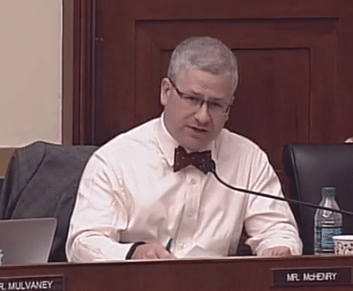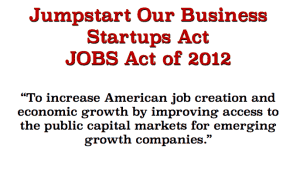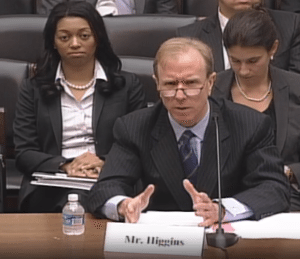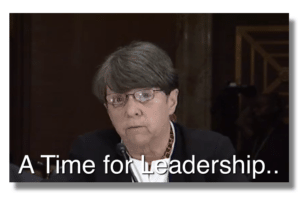The place: Washington, D.C. – the occasion: the swearing in of a new federal agency head – one charged in part with regulating the flow of capital to small businesses. President Obama and others listened with a hopeful ear.
Her words were inspiring, especially to small businesses and budding entrepreneurs:
This country was founded by risk-takers, resourceful pioneers who built this prosperous nation. Entrepreneurialism is our heritage. The American Dream has always been about the opportunity to earn a good education and the keys to your own home, but the expanding American Dream is also about the opportunity to start your own business. I’ve lived that Dream. And as [an] Administrator, I’m determined to help others realize theirs, as well.
* * * *
John F Kennedy once said “All of us do not have equal talent, but all of us should have an equal opportunity to develop our talents.” I’ve come to realize that access to the American Dream means access to capital. Entrepreneurs are the difference-makers in our economy.
[W]e’re working to create the next great American success story and have “. “ helped launch an iconic American ice cream brand, Ben and Jerry’s.”
 Unfortunately, this was not the swearing in of the current SEC Chair – Mary Jo White. And the Ben and Jerry’s launch referred to was not the result of their notable Regulation A offering back in the 1980’s, only one of a handful over the past several decades. Rather, these were the words of the current head of the SBA, Maria Contrares-Sweet, in April 2014.
Unfortunately, this was not the swearing in of the current SEC Chair – Mary Jo White. And the Ben and Jerry’s launch referred to was not the result of their notable Regulation A offering back in the 1980’s, only one of a handful over the past several decades. Rather, these were the words of the current head of the SBA, Maria Contrares-Sweet, in April 2014.
In all fairness, the SBA and SEC do have somewhat divergent missions. Though the SEC’s mission differs primarily in the breadth and focus of its duties – its responsibility to promote capital formation and functional secondary markets for all businesses, big and small, is and remains an integral part of the SEC’s charter.
 Sadly, I have no good news to report on the small business rulemaking front at the SEC – despite meetings this past week with some of the biggest luminaries in crowdfunding, including the father of Title III of the JOBS Act, Congressman Patrick McHenry. Perhaps, even sadder, this is only the most recent chapter in what has been, in my opinion, a long history of neglecting the interests of small business at the SEC.
Sadly, I have no good news to report on the small business rulemaking front at the SEC – despite meetings this past week with some of the biggest luminaries in crowdfunding, including the father of Title III of the JOBS Act, Congressman Patrick McHenry. Perhaps, even sadder, this is only the most recent chapter in what has been, in my opinion, a long history of neglecting the interests of small business at the SEC.
To be sure, the SEC does have some things to crow about. After all, they did promulgate rules allowing businesses of all sizes to publicly solicit investors without registering their offering, so long as they limited their sales to “accredited investors.” Yet even that took an act of Congress – and 18 months of SEC rulemaking to get that endeavor off the ground. And at the end of the day, the biggest beneficiary of the legislation is, once again, big business.
The absence of attention to the capital formation needs of small business at the SEC can be attributed to many factors. However, my immediate focus is more forward-looking – the here and the now.
 What appears to be lacking at the SEC, at least with sufficient visibility and intensity, at least as concerns small business, is twofold: leadership and accountability. Though the jury is still out on the former element, leadership, I nonetheless remain cautiously optimistic that Chair White will soon come to the Commission table and settle what appears to be a sharply divided rulemaking Commission – in particular, Title III Crowdfunding and Title IV Regulation A+ (what some have termed “a mini-IPO”).
What appears to be lacking at the SEC, at least with sufficient visibility and intensity, at least as concerns small business, is twofold: leadership and accountability. Though the jury is still out on the former element, leadership, I nonetheless remain cautiously optimistic that Chair White will soon come to the Commission table and settle what appears to be a sharply divided rulemaking Commission – in particular, Title III Crowdfunding and Title IV Regulation A+ (what some have termed “a mini-IPO”).
Case in Point – Title III Crowdfunding
 The passage by Congress of the crowdfunding provisions of the JOBS Act of 2012 gave many would-be entrepreneurs renewed hope that one more potential source of capital would become available to the smallest of enterprises. But despite the admonition of Congress, that implementing rules be promulgated by the SEC within nine months of April 2012, it took 18 months for the SEC to pen proposed rules. And now a full year later, many are losing hope that final rules will ever be released. Meanwhile, many states are stepping in to fill the void as best they can, given their limited authority under the current federal regulatory scheme.
The passage by Congress of the crowdfunding provisions of the JOBS Act of 2012 gave many would-be entrepreneurs renewed hope that one more potential source of capital would become available to the smallest of enterprises. But despite the admonition of Congress, that implementing rules be promulgated by the SEC within nine months of April 2012, it took 18 months for the SEC to pen proposed rules. And now a full year later, many are losing hope that final rules will ever be released. Meanwhile, many states are stepping in to fill the void as best they can, given their limited authority under the current federal regulatory scheme.
 As to the “when” question – when will final rules be adopted by the Commission? – no one at the SEC is talking. Indeed, in recent oversight hearings at the House of Representatives Financial Services Committee all the director of Corporation of Finance had to say on the subject was “we are working on it.” And even the President of the North American Securities Administrators Association (NASAA) acknowledged privately just last week that he too has no idea when final Title III rules will come out, or what they will say – though according to the SEC’s website he visited with an SEC Commissioner as recently as October 9 to discuss both Title III and Title IV. They are good listeners at the SEC, to be sure, but they are keeping their cards very lose to their vests.
As to the “when” question – when will final rules be adopted by the Commission? – no one at the SEC is talking. Indeed, in recent oversight hearings at the House of Representatives Financial Services Committee all the director of Corporation of Finance had to say on the subject was “we are working on it.” And even the President of the North American Securities Administrators Association (NASAA) acknowledged privately just last week that he too has no idea when final Title III rules will come out, or what they will say – though according to the SEC’s website he visited with an SEC Commissioner as recently as October 9 to discuss both Title III and Title IV. They are good listeners at the SEC, to be sure, but they are keeping their cards very lose to their vests.
And besides the “When” question, many are beginning to question “why.” Why has it taken so long, especially after the SEC carefully crafted proposed rules in a detailed 585 page release one year ago and expending thousands of hours of government manpower?
 Is this a resource issue? I doubt it – not after one year of living with proposed rules, a multitude of comments and most of the heavy lifting accomplished through thousands of hours of Staff time.
Is this a resource issue? I doubt it – not after one year of living with proposed rules, a multitude of comments and most of the heavy lifting accomplished through thousands of hours of Staff time.
Many, including myself, speculate that there are deep divides on the wisdom of crowdfunding, both at the Staff and the Commission level, with its fate hanging on a single swing vote – Chair White. Perhaps some at the Commission are concerned as to how the rules will impact their careers and reputations when they “exit” from the SEC into private enterprise.
And while crowdfunding advocates have repeatedly made their voices heard for the 2 ½ years following passage of the JOBS Act, both at the Commission and in the halls of Congress, even with an act of Congress in hand containing a statutory rulemaking deadline that passed nearly two years ago, crowdfunding advocates are no match for the forces opposed to crowdfunding in Washington D.C., who are well organized and well funded – complete with professional lobbyists and high powered lawyers in tow.
So what’s Up at the Commission?
 Perhaps the swing vote at the Commission level is waiting to see which way the winds are blowing in the November Congressional elections – especially with control of the U.S. Senate hanging in the balance. Then again, perhaps this is nothing more than wishful thinking on my part.
Perhaps the swing vote at the Commission level is waiting to see which way the winds are blowing in the November Congressional elections – especially with control of the U.S. Senate hanging in the balance. Then again, perhaps this is nothing more than wishful thinking on my part.
It is beyond reasonable debate that when it comes to small business the SEC has presented itself as not being accountable to anyone, most notably a nearly unanimous Congress, at least in the area of recent federal legislation of interest to small business – and perhaps not surprisingly. After all, small businesses are the riskiest of investments – with 75% of new businesses ending in failure. No one at the SEC wants their reputation or career tied to a risky initiative. But, small businesses are also the foundation of the U.S. economy – with an ever growing role in job creation – by some estimates half of all jobs created. And when the U.S. Congress speaks, one would hope it not be too much to ask – indeed – insist – that the SEC act.
To be sure, Congress handed the SEC a tall order when it presented it with Title III crowdfunding. But with that said, Congress entrusted the Commission with a great deal of latitude in the rulemaking process – in hindsight, perhaps too much.
The Commission Could Learn a Great Deal About Leadership and Accountability by Observing Some State Securities Administrators – Leadership and Accountability Start at the Top
 In all honesty, I have been lulled into a hypnotic state by the painfully long rulemaking process – so much so that I resisted cries by some crowdfunding supporters in recent months to light a fire under (not in) the Commission with pleas to get the rules out. After all, I reasoned, after three comment letters on the subject, the SEC surely had its fill of me.
In all honesty, I have been lulled into a hypnotic state by the painfully long rulemaking process – so much so that I resisted cries by some crowdfunding supporters in recent months to light a fire under (not in) the Commission with pleas to get the rules out. After all, I reasoned, after three comment letters on the subject, the SEC surely had its fill of me.
The Wakeup Call
But the wakeup call for me came last week in the most unexpected of places – a series of three crowdfunding panels I participated on which included the likes of both a current and former NASAA President, and the General Counsel for a State Securities Administrator.
 On the question of why crowdfunding had not taken off at the state level in his state, the answer of one state official surprised me. The expected answer: it’s a dumb idea, and the small investor will be the loser in the end anyway. The actual answer: It’s our agency’s fault – we haven’t spent as much time as we should on outreach – educating the public on the availability of this new tool for capital formation. Excuses? No. Accountability? Yes.
On the question of why crowdfunding had not taken off at the state level in his state, the answer of one state official surprised me. The expected answer: it’s a dumb idea, and the small investor will be the loser in the end anyway. The actual answer: It’s our agency’s fault – we haven’t spent as much time as we should on outreach – educating the public on the availability of this new tool for capital formation. Excuses? No. Accountability? Yes.
And even more enlightening, another State Securities Administrator said he took the lead to fashion a crowdfunding statute in his state because he wanted to fashion it the way he envisioned it – and not simply leave it to chance with the legislature. Wow! Initiative and Leadership combined. A far cry from what happened when the JOBS Act legislation wound itself through the Congressional sausage making process – when the SEC stood back in apparent horror.
Perhaps even more enlightening was this same State Administrator’s view on the requirement of audited financial statements for crowdfunded offerings at the state level. In his mind this was a no brainer. Of course you would not burden a small business by requiring it to provide audited financial statements for a crowdfunded offering under $1 million.
 Contrast that statement against the position of the Commission on the same issue in the proposed rules. When faced with a statutory requirement of audited financial statements for crowdfunded raises over $500,000, the Commission gave lip service to the other part of the statute which gave the SEC unbridled discretion to modify or eliminate the requirement for audited financial statements in all crowdfunded offerings. In the view of the SEC: No need to tinker with the audited financial statement requirement – at least not yet. Let’s “wait and see” what happens after final rules are implemented. The likely answer to the SEC’s query – crickets.
Contrast that statement against the position of the Commission on the same issue in the proposed rules. When faced with a statutory requirement of audited financial statements for crowdfunded raises over $500,000, the Commission gave lip service to the other part of the statute which gave the SEC unbridled discretion to modify or eliminate the requirement for audited financial statements in all crowdfunded offerings. In the view of the SEC: No need to tinker with the audited financial statement requirement – at least not yet. Let’s “wait and see” what happens after final rules are implemented. The likely answer to the SEC’s query – crickets.
The Proof Will be in the Pudding
 Could it be that the SEC Staff does not want to see retail equity crowdfunding see the light of day as a useful and used tool, despite the strong Congressional mandate? In my view, regardless of the answer to this question, the ultimate outcome is firmly and squarely in the hands of a single individual at the SEC – Chair White – who as a practical matter is subject to many pressures, both internal and external, political and otherwise.
Could it be that the SEC Staff does not want to see retail equity crowdfunding see the light of day as a useful and used tool, despite the strong Congressional mandate? In my view, regardless of the answer to this question, the ultimate outcome is firmly and squarely in the hands of a single individual at the SEC – Chair White – who as a practical matter is subject to many pressures, both internal and external, political and otherwise.
I know that I am not alone in hoping that when the dust settles following Election Day, Chair White will take the bull by the horns, as some state securities czars have already done – and lead through decisive action – with a dose of common sense to boot. And by doing so the Commission can finally make the JOBS Act provisions which hold promise for small business – Crowdfunding and Regulation A+ – a reality.
Let’s Get it Right (Now) – Chair White!
___________________________
 Samuel S. Guzik, a recognized authority on the JOBS Act including Regulation D private placements, investment crowdfunding and Regulation A+, writes a regular column, The Crowdfunding Counselor, for Crowdfund Insider. A consultant on matters relating to the JOBS Act, he recently led a Crowdfunding Roundtable in Washington, DC sponsored by the U.S. Small Business Administration Office of Advocacy. He is a corporate and securities attorney and business advisor with the law firm of Guzik & Associates, with more than 30 years of experience. He is admitted to practice before the SEC and in New York and California. Guzik has represented a number of public and privately held businesses, from startup to exit, concentrating in financing startups and emerging growth companies. He also frequent blogger on securities and corporate law issues at The Corporate Securities Lawyer Blog.
Samuel S. Guzik, a recognized authority on the JOBS Act including Regulation D private placements, investment crowdfunding and Regulation A+, writes a regular column, The Crowdfunding Counselor, for Crowdfund Insider. A consultant on matters relating to the JOBS Act, he recently led a Crowdfunding Roundtable in Washington, DC sponsored by the U.S. Small Business Administration Office of Advocacy. He is a corporate and securities attorney and business advisor with the law firm of Guzik & Associates, with more than 30 years of experience. He is admitted to practice before the SEC and in New York and California. Guzik has represented a number of public and privately held businesses, from startup to exit, concentrating in financing startups and emerging growth companies. He also frequent blogger on securities and corporate law issues at The Corporate Securities Lawyer Blog.


